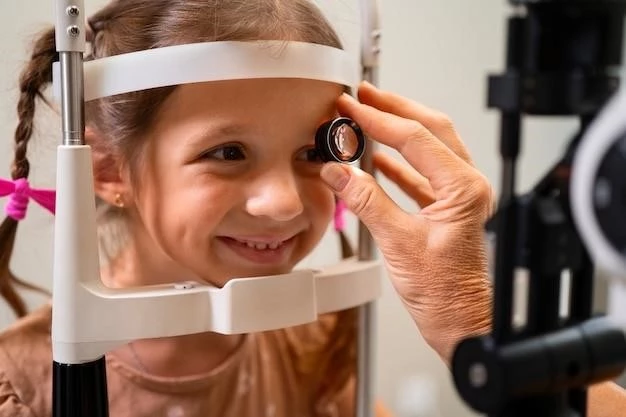Understanding Corneal Anesthesia, Deafness, and Mental Retardation
Corneal Anesthesia⁚ Causes and Treatment Options
Corneal anesthesia, a condition where the cornea lacks normal sensitivity, can be caused by various factors such as neurological disorders, trauma, or certain medical conditions like diabetes. Treatment options depend on the underlying cause and may include medications, surgical interventions, or therapies aimed at restoring corneal sensitivity. It is essential to consult with an ophthalmologist to determine the most appropriate treatment plan tailored to the individual’s specific condition.
For traumatic corneal anesthesia, protective measures and regular monitoring are crucial to prevent further damage and complications. Understanding the root cause of corneal anesthesia is paramount in developing an effective treatment strategy to improve corneal health and overall quality of life for the patient.
Deafness⁚ Types, Symptoms, and Management
Deafness is a complex auditory impairment that can be categorized into conductive, sensorineural, or mixed types based on the affected part of the ear. Symptoms of deafness may include difficulty understanding speech, ringing in the ears, or a sensation of blockage. Effective management of deafness often involves hearing aids, cochlear implants, or other assistive devices tailored to the individual’s needs;
Early diagnosis through comprehensive hearing evaluations is crucial for implementing appropriate management strategies. Communication techniques such as sign language or lip-reading can greatly enhance the quality of life for individuals with deafness. Support from audiologists, speech therapists, and other professionals is essential in developing a holistic approach to managing deafness and promoting effective communication.
Mental Retardation⁚ Understanding the Condition
Mental retardation, also known as intellectual disability, is characterized by limitations in intellectual functioning and adaptive behavior. These limitations manifest during development and can impact various aspects of life, including communication, self-care, and social interactions. Understanding the condition involves recognizing the diverse levels of intellectual functioning and providing individualized support and opportunities for growth.
Individuals with mental retardation may benefit from personalized education plans, therapeutic interventions, and community resources to enhance their quality of life. It is essential to approach mental retardation with empathy, respect, and a focus on maximizing the individual’s strengths and abilities. By fostering a supportive environment and promoting inclusivity, we can empower individuals with mental retardation to lead fulfilling and meaningful lives.
Corneal Anesthesia in Children⁚ Diagnosis and Care
Diagnosing corneal anesthesia in children requires a thorough evaluation by a pediatric ophthalmologist using specialized tests to assess corneal sensitivity and identify the underlying cause. Early detection is crucial to prevent potential complications and ensure proper management. Care for children with corneal anesthesia involves a multidisciplinary approach, including regular eye examinations, protective measures to prevent corneal injuries, and appropriate interventions tailored to the child’s age and individual needs.
Education of caregivers and children about the condition, adherence to treatment plans, and close monitoring of eye health are essential components of care. By providing comprehensive care and support, healthcare professionals can help children with corneal anesthesia achieve optimal eye health and maintain a good quality of life.
Coping with Deafness⁚ Tips for Daily Life
Coping with deafness in daily life can present unique challenges, but there are practical strategies to enhance communication and improve overall well-being. Utilizing visual aids such as sign language, text messages, or captioned videos can facilitate effective communication in various settings. Creating a supportive environment by informing others about your hearing impairment and advocating for accommodations can help people with deafness feel more included and understood.
Establishing routines, utilizing assistive listening devices, and seeking out support groups or counseling can also aid in coping with the emotional aspects of deafness. Embracing assistive technologies and exploring resources for the deaf community can empower individuals to navigate daily life with confidence and resilience. By incorporating these tips into daily routines, individuals with deafness can thrive and engage more fully in their personal and professional lives.
Mental Retardation⁚ Early Intervention Programs
Early intervention programs play a crucial role in supporting individuals with mental retardation by providing specialized services aimed at optimizing development and enhancing quality of life. These programs involve a multidisciplinary approach that may include speech therapy, occupational therapy, behavior management, and educational interventions tailored to the individual’s needs.
Early intervention programs aim to identify developmental delays, promote skills acquisition, and facilitate early communication and social interactions. By focusing on early detection and intervention, these programs can help individuals with mental retardation reach their full potential and improve their overall well-being. Collaborating with healthcare professionals, educators, and families is essential in implementing comprehensive early intervention strategies to address the unique challenges faced by individuals with mental retardation.
Corneal Anesthesia Surgery⁚ What to Expect
Corneal anesthesia surgery is a specialized procedure aimed at restoring corneal sensitivity and function in individuals with impaired corneal sensation. Before the surgery, a comprehensive evaluation by an ophthalmologist is conducted to assess the extent of corneal nerve damage and determine the most suitable surgical approach.
During the surgery, the ophthalmologist may perform nerve grafting, neurotization, or other techniques to repair or replace damaged corneal nerves. Patients can expect a period of recovery following the surgery, during which close monitoring and post-operative care are essential to optimize outcomes and minimize complications.
Understanding the surgical process, adhering to post-operative instructions, and attending follow-up appointments are crucial steps in the recovery journey. By having realistic expectations and actively participating in the treatment plan, individuals undergoing corneal anesthesia surgery can improve corneal sensitivity and protect their eye health in the long term.
Debunking Myths About Mental Retardation
There are numerous myths and misconceptions surrounding mental retardation that contribute to stigma and misunderstanding. It is essential to debunk these myths to promote awareness, acceptance, and support for individuals with intellectual disabilities. One common myth is that individuals with mental retardation lack value or potential, when in reality, they possess unique strengths and abilities that should be recognized and nurtured.
Another myth is that mental retardation is solely a result of poor parenting or environmental factors, when in fact, it is primarily due to genetic, prenatal, or perinatal factors. By dispelling these myths and promoting accurate information, we can challenge stereotypes, advocate for inclusivity, and create a more supportive and compassionate society for individuals with mental retardation.

